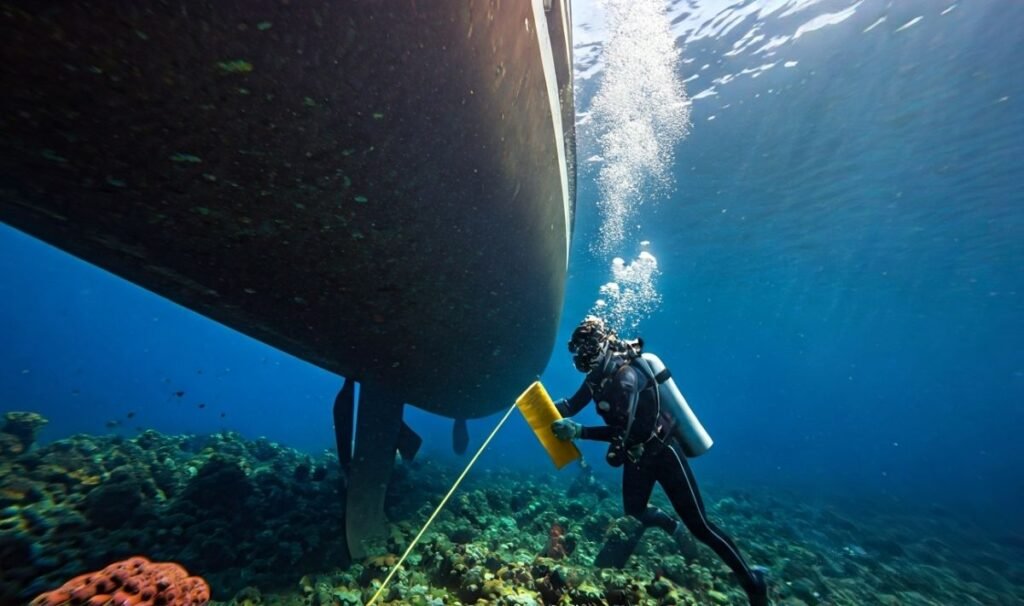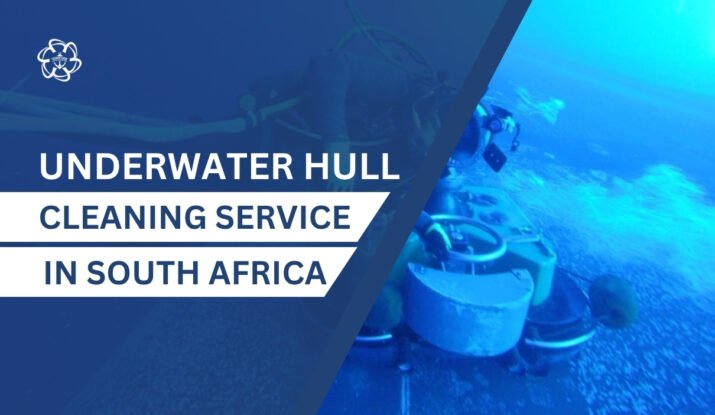Underwater hull cleaning in South Africa is vital for the performance and longevity of commercial vessels. South Africa provides exceptional hull cleaning and dry dock inspection services that enhance the shipping industry while protecting the marine environment. Utilizing advanced technology to eliminate biofouling without harming the sea, their skilled team in Saldanha Bay helps vessels reduce fuel consumption, comply with regulations, and improve overall efficiency, making them an excellent choice for commercial operations in Africa.
What is Hull Fouling?
Hull fouling, or marine biofouling, occurs when algae, barnacles, and mussels accumulate on a ship’s hull. This buildup slows the vessel, increasing fuel consumption and operational costs while extending travel times. For commercial ships, it leads to more downtime and higher expenses.
Additionally, if left unaddressed, marine biofouling can cause long-term damage to the hull. The shipping industry prioritizes this issue and employs regular underwater cleaning to manage it effectively. Innovations like the Envirocart™ system allow for environmentally friendly hull cleaning that maintains performance, adheres to regulations, reduces fuel costs, and protects marine ecosystems.
Benefits of Underwater Hull Cleaning in South Africa
Keeping a ship’s hull clean is essential for several reasons. Underwater hull cleaning in South Africa ensures a smooth surface, allowing the ship to move more efficiently through water, reducing drag and increasing fuel efficiency. This results in lower fuel costs and reduced greenhouse gas emissions.

Additionally, underwater cleaning minimizes the time ships spend in dry dock for inspections. Cleaning occurs while the ship is anchored, eliminating delays. This speeds up delivery times, decreases the frequency of repairs, and enhances reliability in transporting goods while ensuring compliance with environmental regulations.
Environmental and Legal Considerations
Protecting the marine environment is crucial for underwater hull cleaning in South Africa. Employs advanced systems to capture and contain marine biofouling, ensuring zero pollution. Their eco-friendly technology traps waste and prevents harmful substances from entering the water.
Adhering to international and local regulations is also vital. The International Maritime Organisation enforces strict rules on marine biofouling and greenhouse gas emissions, which align with South Africa’s regulations. Technologies and certifications comply with these standards, making them an excellent choice for ships operating in South Africa and across Africa. Their commitment to eco-friendliness and compliance distinguishes them as a leading option for underwater hull cleaning in South Africa.
Importance of Underwater Hull Cleaning in South African Vessels
Hull cleaning services are vital for South Africa’s shipping industry. Ports like Saldanha Bay and Douala port, Cameroon, serve as major international shipping hubs, making it essential for ships to be free of biofouling to ensure efficient movement and compliance with environmental regulations.
Underwater hull cleaning in South Africa helps South African ships save fuel, reduce maintenance costs, and lower GHG emissions. Their eco-friendly solutions assist shipping professionals in meeting regulations while contributing to a more sustainable maritime industry, demonstrating the significant impact on overall efficiency.
Impact on Fuel Efficiency and Operational Performance
Well-maintained hulls enhance fuel efficiency for commercial vessels. A clean hull reduces water drag, allowing ships to move easily and consume less fuel. Underwater services like hull cleaning improve performance and use advanced technology to deliver optimal results, even on tight schedules. Underwater services guarantee quality results, reducing issues and maintaining smooth operations. Regular hull cleaning is essential for cargo and passenger ships, lowering operating costs and boosting efficiency.
Preventing Biofouling and Environmental Compliance
Biofouling poses challenges for vessel operations and harms marine ecosystems. Their systems capture biofouling during cleaning, ensuring zero environmental damage.
Both local and international shipping must adhere to environmental standards. By preventing biofouling, vessels consume less fuel and lower GHG emissions, benefiting the environment and helping operators avoid penalties while demonstrating their commitment to ocean conservation.
Conclusion
To sum up, good underwater hull cleaning in South Africa is very important for keeping vessels in South Africa running well and lasting longer. This regular cleaning helps with fuel efficiency and makes sure you follow the rules that protect the environment.
It is not something you should skip. When you use eco-friendly cleaning methods and stay up-to-date on the best ways to care for your hull, you help your vessel work better and help the whole maritime ecosystem, too. If you want to get started, talk to local experts who know about underwater hull cleaning in South Africa. They can help your vessel meet all industry standards and stay eco-friendly.
FAQ:
Q1. How often should underwater hull cleaning in South Africa be performed in South Africa?
The frequency of underwater hull cleaning depends on vessel usage and hull cleanliness. In South Africa, commercial vessels typically require cleaning every three months. Regular inspections and cleanings ensure optimal performance, reduce fuel consumption, and help maintain compliance with hull maintenance standards both in Africa and beyond.
Q2. Are eco-friendly hull cleaning methods available locally?
Yes, eco-friendly hull cleaning in South Africa using the Envirocart system, which captures and cleans marine biofouling without harming the environment. They adhere to local regulations in Mauritius, ensuring compliance while promoting sustainable practices for marine health in Africa.
Q3. What are the risks of not cleaning a vessel’s hull regularly?
Neglecting hull cleaning allows marine biofouling—sea plants and animals—to accumulate on the hull. This buildup makes the ship less maneuverable, increases fuel consumption, and raises costs. Over time, you may face more downtime, higher repair expenses, and reduced performance. Regular hull cleaning is essential to avoid these issues.
Q4. Can hull cleaning be done while a ship is docked or only underwater?
Hull cleaning can be performed underwater or while at anchor, eliminating the need for dry dock checks. Their professional diving contractors ensure minimal disruption for ship owners.
Q5. How does underwater hull cleaning in South Africa contribute to sustainability in shipping?
Underwater hull cleaning enhances fuel efficiency, reduces greenhouse gas emissions, and prevents biofouling. Complying with environmental regulations, the company is an excellent choice for shipping firms seeking sustainability. Hull cleaning boosts your business’s eco-friendliness while cutting fuel costs.


